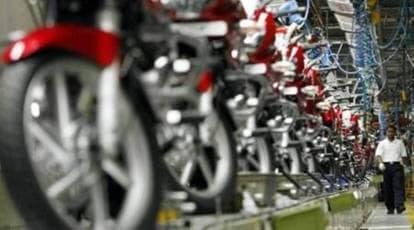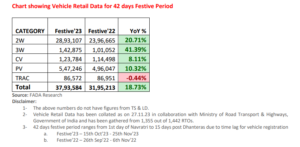Overview
The Federation of Automobile Dealers Associations (FADA) unveiled the Vehicle Retail Data for the 42-day festive season. As per the data provided by FADA, 37,93,584 vehicles were successfully sold in India during this period, reflecting a remarkable 18.73% surge compared to the previous year.
The festive duration, commencing with Navratri and extending 15 days beyond Dhanteras, not only set a new record in car sales but also witnessed substantial growth across various vehicle categories, including two-wheelers, three-wheelers, commercial vehicles, and passenger vehicles.
The FADA report highlighted a noteworthy increase in overall car sales during this festive season, with the tractor segment being the sole exception, experiencing a marginal decline.
Segment-wise Analysis and Insights
Passenger vehicle sales experienced a notable uptick of 10.32%, soaring from 4,96,047 units to an impressive 5,47,246 units. Concurrently, the two-wheeler segment witnessed a robust surge of 20.71%, with sales escalating from 23,96,665 units to an outstanding 28,93,107 units.

The three-wheeler segment emerged as the star performer, registering an exceptional growth of 41.39%. The festive season of 2023 witnessed the sale of 1,42,875 units compared to the previous year’s 1,01,052 units.
Commercial vehicle sales saw a commendable rise of 8.11%, climbing from 1,14,498 units to 1,23,784 units. However, tractor sales experienced a marginal dip of 0.44%.
Despite an initial 8.3% decline in tractor sales during Navratri, there was a remarkable recovery, culminating in a 0.5% decrease by the end of the festive period.

The festive duration commenced with Navratri and extended 15 days beyond Dhanteras.
Mr Manish Raj Singhania, the President of FADA, remarked that during the 42-day festive period of FY2023, a new milestone was reached, with vehicle sales climbing to 37.93 lakh—an increase of 19% from the previous year’s 31.95 lakhs.
He mentioned that significant growth was observed in various segments, such as two-wheelers, three-wheelers, commercial vehicles, and passenger vehicles, with respective rises of 21%, 41%, 8%, and 10%.

Singhania shared that record-breaking sales were reported in several categories, and rural areas notably contributed to the surge in two-wheeler purchases. Despite an initial underperformance during Navratri, particularly in the passenger vehicle sector, he pointed out that Diwali improved the situation, concluding with a 10% growth rate.
SUVs, according to him, were the vehicles in the highest demand. Still, he expressed concerns over inventory levels for passenger vehicles. He mentioned that OEMs continue to push for further dispatch, maintaining inventory rates near all-time high levels.
What is FADA?
Established in 1964, the Federation of Automobile Dealers Associations (FADA) is the foremost national entity in the Indian Automobile Retail Industry.
Its scope encompasses the sale, service, and spares of 2 & 3 Wheelers, Passenger Cars, SUVs, Commercial Vehicles (including buses and trucks), and Tractors.
FADA India boasts a representation of over 15,000 Automobile Dealerships, spanning more than 30,000 dealership outlets, including multiple associations of automobile dealers at the Regional, State, and City levels, collectively representing the entire Auto Retail Industry.

Under the umbrella of FADA India, the industry employs approximately 5 million people at dealerships and service centres. Furthermore, FADA India actively networks with sectors and authorities at the Central and State levels.
It provides valuable input and suggestions on critical aspects such as auto policy, taxation, vehicle registration procedure, road safety, and environmental sustainability. This collaborative effort aims to foster the growth of the Automobile Retail Trade in India.
Conclusion
In conclusion, FADA’s unveiling of Vehicle Retail Data for the 42-day festive season reflects a vibrant automotive market in India, with a significant 18.73% surge in sales. While celebrating the impressive surge in sales, it’s crucial to prioritise environmental responsibility. Opt for public transport to reduce carbon footprint. Additionally, consider carpooling or choosing eco-friendly vehicles like electric cars. Small changes collectively make a significant impact in preserving our planet.











